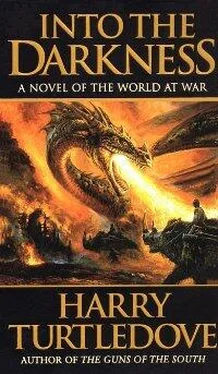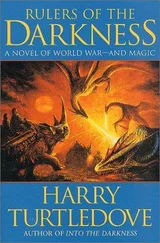Leudast chuckled, too; a Forthwegian peasant’s problems were none of his own. “I wish those unicorns were behemoths, is what I wish,” he said.
“Aye, that’d be good,” Magnulf agreed, laughing still. “Then he’d have bigger holes in the ground to worry about.”
That wasn’t why Leudast wished he saw more behemoths. All through Algarve’s victory over Forthweg, and then in her smashing wins against Valmiera and Jelgava, her behemoths had done more than their share of the damage. Everyone said so. The summer and autumn before, he’d spent a lot of time training against horses tricked out as behemoths. The more of the great beasts he saw with Unkerlanter crews atop them, the happier he’d be.
He kept looking up into the sky, and cocking his head to one side to try to catch the harsh cries of dragons overhead. As with the behemoths, he saw and heard some, but not so many as he would have liked. When he remarked on that to Magnulf, the sergeant said, “Be thankful you don’t see any flying out of the east. We’re getting too bloody close to the border now. Here’s hoping we’ve caught the redheads napping.”
“Aye, here’s hoping,” Leudast said in what he hoped wasn’t too hollow a voice. “Nobody else has managed to do that yet.”
Magnulf spat in the dirt. “They put one arm in a tunic sleeve at a time, same as we do. Remember”—he planted an elbow in Leudast’s ribs—“if they were as great as they think they are, they’d have won the Six Years’ War. Am I right or am I wrong?”
“You’re right, Sergeant. Can’t argue with that.” Leudast tramped on, feeling a little happier. His back ached. His feet ached. He wished King Swemmel’s impressers had never found his village. He’d spent a lot of time wishing that. He didn’t know why. It never did any good.
The regiment camped in the fields that night. That would give the Forthwegians who farmed them more work to do come morning—work likely to be undone when more Unkerlanter soldiers came through heading east. Leudast lost no sleep over that, or over the provenance of the chunks of mutton and chicken in the cookpots. Leudast lost no sleep over anything. As soon as he helped Magnulf make sure the squad was safely settled, he rolled himself in his blanket and plunged into slumber almost at once. He did not expect to wake till the rising sun pried his eyelids open.
But the first eggs fell out of the sky when morning twilight was barely beginning to stain the eastern horizon with gray. Now he heard dragons’ cries, fierce and raucous. The beasts swooped low above the Unkerlanter encampment, dropping their eggs and then gaining height once more with thunderous wingbeats. Some came close enough to the ground to flame before they flew higher. More flames sprang up from tents and wagons they set afire.
Leudast seized his stick and started blazing at them, but the sky was still so dark, he had no good targets. Even with a good target, he knew a foot-soldier had to be lucky—had to be more than lucky—to bring down a dragon. He kept blazing anyhow. If he didn’t, he had no chance at all to bring one down.
An egg burst close by him, knocking him off his feet and rolling him along the ground like a pin in a game of sixteens. He knocked over a couple of other soldiers, too, just as a well-struck pin would have done, though not enough to gain a good score. They shouted and cursed, as he did. Men were screaming, too, at the top of their lungs.
Some of those screams burst from the throats of wounded men. Others were shouts of anger or, more often, horrified astonishment: “The redheads!” “The Algarvians!” “King Mezentio’s men!”
They’ve got a lot of cursed nerve, hitting us first, Leudast thought. The ground shook beneath his feet as another egg burst nearby. We were supposed to hit them first, catch them by surprise.
That hadn’t happened. It wasn’t going to happen, not now. Remembering how his officers said the Algarvians liked to fight, Leudast had a sudden nasty premonition of what was likely to happen next. “Prepare to receive attack from the east!” he shouted to his squad and anyone else who would listen. “The redheads will be hitting us with foot and cavalry and those stinking behemoths, too!”
“Aye, that’s the truth!” No one who knew Sergeant Magnulf could mistake his bellow. “That’s what those cursed Algarvians think efficient fighting’s all about. Now that the dragons have knocked us cockeyed, they’ll send in the men on the ground to try and flatten us.”
Here and there in the madness—which did not cease, for Algarvian dragons kept on pounding the encampment—officers also tried to rally their men. But some officers were killed, some were hurt, and some, with action upon them, turned out to be worthless. Leudast watched one run for the west as fast as he could go.
He had no time for more than one quick curse aimed at that captain’s back. Then more eggs started falling on the tents. These were smaller than the ones the dragons carried, which meant the Algarvians had already got tossers over the border and into the part of Forthweg Unkerlant occupied. Leudast shook his head. No—the part of Forthweg Unkerlant had occupied.
A wild shout came from sentries posted east of the camp: “Here they come!”
“Come on, you whoresons!” Leudast yelled. “If we don’t fight the redheads, they’ll kill all of us.” Even if his comrades did fight the Algarvians, King Mezentio’s men were liable to kill them all. He chose not to dwell on that.
Now, instead of reaching for his stick, he grabbed his shovel off his belt and dug frantically. He had no time to make a proper hole from which to fight, but a little scrape with the dirt he’d dug thrown up in front of it was better than nothing. He lay flat in the scrape, rested his stick on the dirt parapet, and waited for the Algarvians to get close enough to blaze.
And then Colonel Roflanz, the regimental commander, shouted, “The attack must go on as ordered. Forward against the foe, men! King Swemmel and efficiency!”
“No!” Leudast and Magnulf yelled it together. Both of them had seen enough combat to know Roflanz was asking to get himself slaughtered, and everyone who followed him, too. The men in their squad, or the two or three of them close enough to hear their corporal, held their places. But far more men followed Roflanz. He was their leader. How could they go wrong if they followed him?
They found out. It did not take long. Algarvians on behemoths blazed them with heavy sticks at ranges from which they could not reply. Other behemoths bore light egg-tossers. Bursts of sorcerous energy flung Unkerlanter soldiers aside, broken and bleeding. And the behemoths themselves, armored against footsoldiers’ weapons, lumbered forward and trampled down King Swemmel’s men. The Algarvians swarmed into the holes torn in their ranks.
Leudast almost started blazing at the first men he saw running back toward him. With the new-risen sun shining in his face, they were hardly more than silhouettes. His finger was already halfway into the blazing hole when he realized the men wore long tunics, not short tunics and kilts.
“Fall back!” one of them shouted, stumbling past his position. “If you don’t fall back, everything’s lost. Powers above, if you do fall back, everything’s lost, too.” Away he went, at least as fast as the captain who had incontinently fled when Algarvian dragons started dropping eggs on the encampment.
Magnulf said, “If the redheads make us fall back, I’ll do it. But I’m cursed if I’ll run away just because some coward tells me to.”
“Aye, by the powers above,” Leudast said. There—there ahead of him were men in kilts. He blazed at them. They went down. Maybe he’d hit one or two, maybe they were battlewise like him, and knew enough to make themselves smaller targets. Either way, he whooped. “We can stop the whoresons!”
Читать дальше












